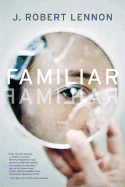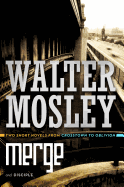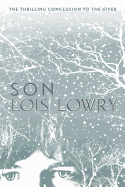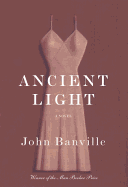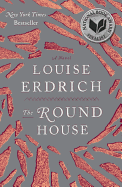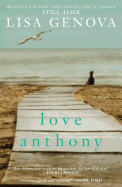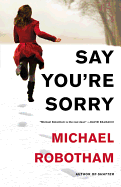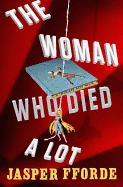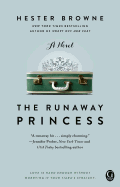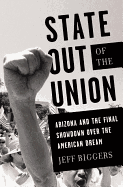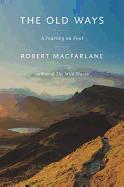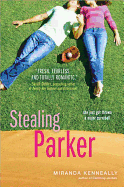Tuesday, October 16, 2012
Earlier this week, Pulitzer-winning author Geraldine Brooks wrote an article for the Guardian entitled "People of the Bookshelf" (and if you're reading this, you're certainly one of us). In it, she talks about her unusual method of organizing her bookshelves:
"I start out conventionally enough, alpha by author. But while I take account of the first letter of the writer's surname, I have other ambitions for my shelves that transcend the conveniences of mere alphabetical accuracy. It's impossible for me to place one book alongside another without thinking about the authors, and how they would feel about their spine-side companion.
"I arrange my shelves as I would seat guests at a dinner party. Anne Tyler and Anthony Trollope both seem devoted to a diligent scrutiny of manners. So I imagine them, shelved side by side, comparing notes on the mores of their respective eras.
"I thought I was alone in my craziness, until I confessed it to a friend whom I consider a model of sanity in most respects. 'That's nothing,' he said. He confided that he had a 'punishment shelf' in his garage, reserved for writers he does not like."
My own shelves are arranged, very very loosely, by category in nonfiction. But in fiction, a nearly complete set of Tarzan books (the original editions, from my father) shares space with Shakespeare and Dorothy Parker. I call them all classics.
 We wondered, on Twitter and Facebook, how you shelve your books. A good number of you don't organize at all (Deborah wrote: "very randomly--life's more adventurous that way"), while most stick with the tried-and-true alphabetical; shelving by color is popular, too. @bookletting replied: "1st, by when I read them." @Peacock10 does it "By height. Tall to short then to tall again. My eye needs symmetry." And @StaceyLMason organizes "by how a book made me feel."
We wondered, on Twitter and Facebook, how you shelve your books. A good number of you don't organize at all (Deborah wrote: "very randomly--life's more adventurous that way"), while most stick with the tried-and-true alphabetical; shelving by color is popular, too. @bookletting replied: "1st, by when I read them." @Peacock10 does it "By height. Tall to short then to tall again. My eye needs symmetry." And @StaceyLMason organizes "by how a book made me feel."
Hmm, I think I feel the urge to reorganize.... --Robin Lenz, managing editor, Shelf Awareness
Familiar
by J. Robert Lennon
J. Robert Lennon's slim novel Familiar contains parallel worlds, two corresponding sets of characters and an incisive depiction of its protagonist's psychology as she navigates a life that is unrecognizable, but strangely... familiar. It begins when an crack in Elisa's windshield vanishes; suddenly, she's driving a new car, wearing strange clothes, and her body is 15 pounds heavier. She finds her way home, but now her failed marriage seems to be intact again--and her son Silas, who died eight years ago, is full-grown and alive.
This isn't the fantastical reprieve it seems, though. Elisa's relationship with her husband is governed by bizarre rules imposed on them by a therapist, including a deliberate estrangement from their two grown sons. When she seeks them out anyway, she finds that Silas has grown into the twisted person she feared he would--and the son who survived and thrived in the world she knows is far worse off in this one.
"She will live in hell if she has to," Elisa thinks, obsessed with finding an explanation, "if only somebody will tell her that yes, it's hell, and she does not belong here." But time passes, the two worlds blur, and whether Elisa is crazy or the victim of a freak cosmic event is beside the point: this is not a crisis of reality, but one of identity.
Lennon's smart, chilling prose and the urgency of present tense carry this story to its dramatic, if ambiguous, conclusion. --Hannah Calkins, blogger at Unpunished Vice
Discover: A smart, fast-paced novel about a woman who gets back the son and marriage she lost--but at a profound and strange price.
Ancient Light
by John Banville
Banville readers have met Alexander Cleave before, in the novel Eclipse. This time, the stage actor is invited to star in a movie. He is somewhat puzzled at being chosen but takes the role, playing a man who was in Portovenere at the time his pregnant daughter killed herself there. Could they have known one another? (If you've read another Banville novel, Shroud, you already know the answer.)
The past is what Alexander Cleave is about, starting with a nostalgic reminiscence of an adolescent love affair with the mother of his best friend. She is more than twice his age and, as might be imagined, their time together is one of lust unalloyed. In recalling past events, he has a hard time remembering significant details, yet Banville's genius for description puts the reader in the picture completely. Banville has said elsewhere it is impossible to write about sex, so he doesn't. Instead, he shows us everything else: the landscape, the color of Mrs. Gray's dress, the texture of her skin, the apprehension and anticipation of their time together--and the inevitable end of the affair, which isn't exactly as Cleave thinks it was.
Meanwhile, after Cleave's co-star attempts suicide, he takes her to Portovenere, an act that leads him to revisit the anguish over his daughter's suicide. In his heart of hearts, Cleave knows he cannot bring his daughter back, but is still compelled to search for some ancient light that might illuminate his past. Banville, an exquisite prose stylist, takes the reader along. --Valerie Ryan, Cannon Beach Book Company, Ore.
Discover: Is there any difference between memory and invention? Booker Prize winner John Banville probes this question through the fictional memoir of Alexander Cleave, a character familiar to his fans.
The Round House
by Louise Erdrich
Louise Erdrich's The Round House takes readers inside the mind of an Ojibwe man, who, like Scout in To Kill a Mockingbird, looks back as an adult on a formative experience of youth--beginning, in this case, in the summer of 1988. In the opening scene, 13-year-old Joe Coutts and his father, a tribal judge, are working to uproot saplings that have gotten into the foundation of their home, a symbolic representation of the fragility Erdrich depicts throughout the book. Soon after, Joe's mother, Geraldine, is violently raped, and though she knows who attacked her, she's unclear exactly where it took place, leaving unresolved the question of which law enforcement agency has jurisdiction over the crime.
The tribal legal system that Joe studied and respected through his father has failed. This horror changes his life, and the only thing Joe knows for certain is that he must do something, although he does not realize what the pursuit of justice will do to him and his family.
The Round House is a picture of magnificent contradictions, and Joe's experience is a microcosm of Native American history, as the strength and determination of the people empower them to adapt and survive. With its passionate prose--plunging us directly into Joe's consciousness, without even quotation marks to filter the raw experience--heartbreakingly realistic characters and intimate understanding of Native culture, Erdrich's stunning novel reminds us it is a crime Native Americans ever had to adapt in the first place. --Jen Forbus of Jen's Book Thoughts
Discover: A 13-year-old boy pursues justice for his mother, only to learn justice isn't quite so simple.
Love Anthony
by Lisa Genova
Love Anthony is a novel that compassionately yet honestly depicts the reality of being the parent of an autistic child. Set on the island of Nantucket in the off-season, Lisa Genova's story is both eye-opening and unforgettable. With a Ph.D. in neuroscience from Harvard, Genova knows her stuff from a technical standpoint; as a novelist, she adds an invigorating story, a fascinating setting and phenomenal supporting characters. Told from the point of view of a young mother, Olivia, who is grieving the death of her son Anthony, this book will pierce your heart.
However, that's not enough for the unstoppable Genova. She interweaves another tale into her novel, about a fellow Nantucket resident, Beth, who has recently learned her husband is having an affair. She kicks him out and rediscovers her passion for writing. The subject she tackles for her budding novel? What life is like for a boy with autism. Beth and Olivia form an almost mystical connection where they are able to begin healing from their respective heartbreaks in ways neither thought possible.
Genova delivers two riveting, brilliantly written tales of ordinary women facing extraordinary hardships; Beth's book-within-the-book further illuminates the struggle of raising a child with autism. Love Anthony has the power to transform any reader's assumptions regarding this mostly misunderstood disease. --Natalie Papailiou, author of blog MILF: Mother I'd Like to Friend
Discover: Another not-to-be-missed novel from Genova (Left Neglected) that weaves together stories of marital infidelity, autism and unconditional love.
Mystery & Thriller
Say You're Sorry
by Michael Robotham
Michael Robotham's Say You're Sorry, the fifth novel featuring clinical psychologist Joe O'Loughlin, plumbs the depths of the depravity sociopaths inflict on young girls, a recurring theme in this series. Three years after Piper Hadley and Tash McBain, both 15, went missing, Tash's body shows up frozen in a lake near a farmhouse in which two people have been savagely murdered. Police ask O'Loughlin to evaluate a suspect in custody, which leads to his hunch not just that the two incidents are related, but also that Piper is alive and being held nearby. Time might be running out, though, and O'Loughlin must use all his deductive skills to find her before the killer gets rid of her, too.
O'Loughlin's heroism in this novel, as throughout the series, doesn't come from martial-arts skills or Navy SEAL training; in fact, Parkinson's sometimes causes his body to fail him. Instead, his heroism stems from his intellect and his immense compassion for others.
Robotham also does an impressive job of capturing the voice and nature of teenage girls. Piper's diary entries never read as if they were written by a man, and O'Loughlin's adolescent daughter, Charlie, is realistically mercurial without being annoying. The motivation for the perpetrator's horrific crimes feels a bit thin; then again, even in the real world, people seem to require very little provocation to do unspeakable things. --Elyse Dinh-McCrilllis, freelance writer/editor, blogging at Pop Culture Nerd
Discover: Another psychologically insightful thriller featuring the empathic Joe O'Loughlin.
Science Fiction & Fantasy
Merge / Disciple: Two Short Novels from Crosstown to Oblivion
by Walter Mosley
Walter Mosley may be best known for his Easy Rawlins mysteries, but he's no stranger to science fiction. Merge/Disciple is the second collection of two short SF novels from Mosley in 2012 (after The Gift of Fire and On the Head of a Pin); like the previous volume, it presents the pair in "Ace Doubles" format, where readers flip the book over after finishing one story to start the other.
In Merge, Raleigh Redman is a recent lottery winner with tons of money and very few friends. Alien visitors appear around the world, retaliating with violence when attacked. One of these aliens visits Raleigh, who slowly nurses it back to health. Disciple tells of Hogarth "Trent" Tryman, a data entry clerk with few prospects in life. He's contacted via his computer to Bron, an intelligence with extensive knowledge and power. Bron gives Trent the top spot at his data company, a series of tasks to complete and a vision of the future that doesn't always have humankind's best interest at heart.
Both novels feature a lonely, discarded black man--disconnected and neglected by society--in the central role, placing the fate of the world in their hands. The stories sparkle with literary energy, shedding light on the human condition from an atypical perspective. Mosley proves himself a master of both outsider and speculative fiction, rising above mere genre to ask the big questions. --Rob LeFebvre, freelance writer and editor
Discover: Mosley's science fiction explores existential issues through the lives of disempowered black men whose encounters with otherworldly intelligence promise to transform the world.
The Woman Who Died a Lot: A Thursday Next Novel
by Jasper Fforde
Jasper Fforde fans, rejoice! The Woman Who Died a Lot, the seventh installment in his Thursday Next series, delivers all the imagination, complexity and laughs we've come to expect from Fforde and his book-hopping, butt-kicking heroine.
Following the events of One of Our Thursdays Is Missing, Thursday's physical injuries have forced her to retire from Jurisfiction, a policing agency that deals with crime in the BookWorld, a literary parallel universe agents enter by reading books. Middle-aged and no longer strong enough to read herself into BookWorld, Thursday begins new career as chief librarian of the Swindon All-You-Can-Eat-at-Fatso's Drink Not Included Library. Not only is her new gig more difficult--and dangerous--than Thursday expected, her son, Friday, is despondent now that his career has been erased by the disbandment of the time-traveling ChronoGuard. Meanwhile, her daughter Tuesday is struggling to build a shield to prevent an angry deity from smiting downtown Swindon, and her other daughter Jenny doesn't really exist (she's a fake memory implanted in Thursday's mind by Aornis, the sister of her nemesis Acheron Hades). Add in the evil Goliath Corporation's constant attempts to replace Thursday with a synthetic replica of herself and its sudden interest in obscure 13th-century manuscripts, and Thursday just might be in for her most challenging workweek yet.
Although definitely not for the Fforde first-timer--the uninitiated should begin with The Eyre Affair--The Woman Who Died a Lot brings together the charming lunacy and intricate plotting that have enthralled Fforde's readers over the years. --Jaclyn Fulwood, blogger, Infinite Reads
Discover: The continued adventures of book-hopping, butt-kicking heroine Thursday Next.
Romance
The Runaway Princess
by Hester Browne
Amy Wilde is a garden designer who specializes in small high-rise spaces in London. She loves bringing bits of wilderness to the big city, and is happy to be single and hardworking--until she meets Leo, who is both incredibly handsome and thoughtful. Suddenly, she can't focus on her work. Amy goes out with Leo, and finds herself falling for him in a big way. But then her flatmate Jo reveals the truth: Leo is Leopold Wolfsburg, Prince of Nirona.
Amy is flustered; she grew up in a small Yorkshire town, and doesn't know how to deal with the sudden spotlight. Finding photos of herself in magazines and on gossip sites is surreal. But Leo's love makes it all worthwhile, until a sudden change in the Nironian succession puts Leo in line to inherit the throne. Can Amy deal with the increasing media glare and Leo's royal family? Or will the call of her common life and gardening dreams prove to be greater than her love for Leo?
Hester Browne's The Runaway Princess is a fun, frothy book that explores love in many facets: Amy and Leo's sweet love, her snarky but fantastic friendship with Jo and her complicated relationship with her family. Browne manages to make all of these relationships completely believable, and downright funny sometimes, in spite of the farfetched fairytale plot. Amy's anguished internal monologue as she tries to find her own happily-ever-after will keep the reader chuckling. --Jessica Howard, blogger at Quirky Bookworm
Discover: Amy's engaged to a real-life prince, but her family secrets may be about to end her fairytale.
Current Events & Issues
State Out of the Union: Arizona and the Final Showdown over the American Dream
by Jeff Biggers
The Arizona of Wild West lore was an outpost of lawlessness and philosophical extremes, a territory whose minority labored hard to live the American Dream but who simultaneously dealt a discriminatory blow to its native majority. In State Out of the Union, Jeff Biggers says not much has changed: the state remains a fertile breeding ground for inflammatory rhetoric and ground zero for the national debate on immigration policy.
Even from its earliest days, Biggers says, Arizonans were cut from a different cloth, its history mirroring the rise of Tea Party fringe extremism and its philosophy molded by corporate interests cloaked in patriotic overtures. This is the state where copper mining strikes by immigrant workers resulted in mass crackdowns and deportations, where President Eisenhower authorized door-to-door searches for illegal aliens and, decades later, Sheriff Joe Arpaio stands at the head of those eager to enforce border justice. But it's also the home state of Latino activist Cesar Chavez and the Tucson students and teachers who recently fought back against the suppression of ethnic studies classes in the public school curriculum.
Biggers leaves no doubt where he stands concerning his home state's political bent. Nevertheless, as a matter of cultural and historical record, State Out of the Union leaves readers with much to consider. --Nancy Powell, freelance writer
Discover: An Arizona native examines the state's controversial role in defining the American Dream, especially with respect to immigrants, and its impact on national politics.
Travel Literature
The Old Ways: A Journey on Foot
by Robert MacFarlane
Robert Macfarlane's interest in walking goes far beyond exercise or a casual evening stroll. His lyrical account of walking ancient paths in The Old Ways stretches to encompass poetry, cartography, sailing, science, birds, beasts, mountain climbing, folklore and other topics too numerous to list--and he proves a knowledgeable and fascinating guide in every aspect.
Macfarlane traces dozens of ancient paths on land and sea, beginning in Cambridgeshire, England, but eventually stretching from the Outer Hebrides to the Himalayas. He spends a night in a haunted stone circle, crosses barbed-wire boundaries in Palestine and follows part of the Camino de Santiago in Spain. He renders each place and its inhabitants (human and otherwise) in precise, vivid detail, while exploring how outer landscapes shape our inner journeys, both as we walk a landscape and long after we have left it. For Macfarlane and the guides he meets along the way, walking becomes a way of knowing oneself, of turning inward through outward motion, a constant exchange of discovery and self-discovery.
Macfarlane idolizes the early 20th-century English walker and poet Edward Thomas, whose spirit permeates these pages but sometimes threatens to take over, especially toward the end. The greater pleasure lies in reading Macfarlane's own perspective as he explores the ways we mark our landscapes, and the ways they, in turn, mark us. --Katie Noah Gibson, blogger at Cakes, Tea and Dreams
Discover: A meandering, brilliantly written meditation on how humans mark the landscapes they walk, and the paths to self-discovery that emerge during their treks.
Children's & Young Adult
Son
by Lois Lowry
With Son, Lois Lowry offers a spellbinding finale to her The Giver Quartet, revisiting themes from her earlier titles in surprising, deeply resonant ways.
Son begins in the community of The Giver. Lowry here tells the story of Claire, who was assigned to the role of Birthmother. We meet Claire at age 14 as she is being blindfolded in preparation for giving birth to her first Product. Something goes wrong, and she is "decertified." Claire learns that her Product's number is 36, and the official also lets slip that "he's fine," then corrects herself: "I mean that it's fine." Through Claire's efforts to stay connected to her son, we learn that his name is Gabe, and fans of The Giver will quickly infer that this is also a continuation of Jonas's story.
Claire's pull to her son takes her on a journey that brings all the heroes of Lowry's previous Giver books together. Lowry suggests it takes all of their collective wisdom to overcome their greatest threat. The elders in The Giver and Gathering Blue believed that knowledge should be held by a few for the good of the many. But the people of the community where Claire's son lives know--through painful trial and error--that knowledge shared and freedom of choice can build strength among its citizens. Now they are put to an extreme test. Lois Lowry keeps the suspense mounting until the final pages in this stunning conclusion to her Giver Quartet. --Jennifer M. Brown, children's editor, Shelf Awareness
Discover: Lois Lowry's conclusion to The Giver Quartet, which stands alone and also threads together all four books in an astonishing web of connections.
Stealing Parker
by Miranda Kenneally
Miranda Kenneally takes readers back to Hundred Oaks High, the setting of her debut novel, Catching Jordan, for the story of a girl looking for a new life in her old town.
Parker Shelton's mother announced she was a lesbian and "ran off with her friend who was more than a friend." This caused a scandal in their town of Franklin, Tenn., and changed 17-year-old Parker from valedictorian and all-star softball player to someone just getting by, with no interest in sports whatsoever. When her friend Drew Bates (who played football in Catching Jordan) signs Parker up to be manager of his baseball team, she meets the assistant coach: "His big brown eyes meet mine and my breath sputters." From there, Parker feels torn between what her conscience tells her is right and spending time with the off-limits 23-year-old Brian Hoffman. An interaction between the two sums up their understanding that this is a forbidden flirtation: "If you're gonna call me The Hoff, I'm gonna give you a nickname too."/ "Such as...?"/ "Trouble. I'll call you Trouble."/ "Cliché."/ "Touché."
Kenneally's writing style catches readers' interest from the very first line. Parker grows deeply throughout the book, and the glimpses of characters from Kenneally's debut novel will please her fans. A more complex story than her first, Kenneally's sophomore effort knocks it out of the park with character development, clever dialogue and a pace that will keep any reader interested. --Shanyn Day, blogger at Chick Loves Lit
Discover: Parker Shelton, a teen caught up in family issues whose friends force her to find a way to recover.


